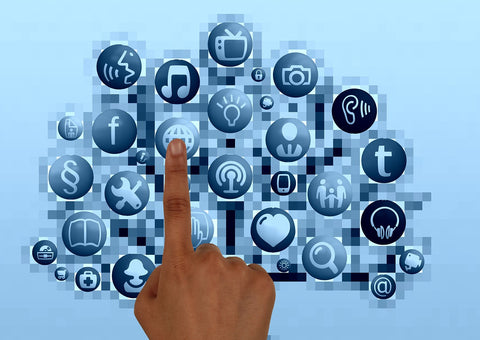
How Social Media Affects Your Mental Health
We've all felt it from time to time, that feeling that we're spending too much time on social media and that maybe we need to take a step back. With so many different social media sites now, it can feel overwhelming the number of accounts you need to keep up with and sometimes it just gets too much.
Social media and mental health have been linked in a range of recent studies that suggest that too much social media can lead to poor mental wellbeing and mental health problems. Though social media was designed to keep us connected, new features and a lack of physical contact with people can lead to feelings of depression, anxiety and social isolation, particularly in young adults.
We've been doing some research into how social media can affect your mental health and we've gathered all our research into this blog post. To find out more about common causes of mental health issues, how these are exacerbated by social media, and how to come off social media and boost your mental health, keep reading now.

Common causes of mental health issues
Poor mental health and wellbeing have a range of common causes and while not all mental health problems can be linked to these things, the vast majority can. Young people's mental health, in particular, can be linked to excessive social media use and below we have rounded up the common causes of mental health problems that can also be linked to social media.
Common causes of mental health problems that can be exacerbated by social media include:
- Social isolation and loneliness. This feeling can be caused by social media as we compare ourselves to others and watch others who appear to have better social lives than we do broadcast their 'highlight reel' online. Additionally, the lack of physical contact with others that is promoted by social media can lead us to feel disconnected from others.
- Social disadvantage. Another form of comparison that can lead to poor mental well being is the comparison between the things others have. Constantly seeing people in the latest trend or at the latest cool hangout can lead to feelings of disadvantage and inadequacy. These feelings can lead to illnesses like depression and anxiety.
- Stress. Sometimes, constantly scrolling social media platforms can lead to distraction from things that are pressing in your life, meaning you miss deadlines and feel more stressed. Additionally, spending time on social media platforms can be used as a crutch when you're feeling particularly stressed, leading to doomscrolling and feeling angered by things you see.
- Bullying. Bullying is a huge cause of mental health issues and cyberbullying is very common on social media platforms. With little that can be done about cyberbullying, it is not uncommon in young people's lives to feel attacked, belittled and made fun of online.
There are other causes of mental health struggles that may be associated with social media, but these few seem most linked. Additionally, a person's work and home life can affect mental health along with their diet, exercise regime, and the amount they sleep. Though they may not fix all problems, eating a varied and healthy diet that is rich in plant foods, like grains and nuts, and getting enough sleep, can all help to promote better mental health.

Social media and mental health problems
Social media and mental health issues have been linked a few times in recent studies, and though data is not complete, many experts agree that too much social media can have negative mental health outcomes. As previously mentioned, social media can exacerbate certain problems, including feelings of inadequacy, fear of missing out (FOMO), social isolation, depression and anxiety, cyberbullying, and self-absorption. These issues can all lead to poor mental health.
Social media promotes a so-called 'highlight reel' wherein users only show the best bits of their lives, showing off the latest trend or the latest party they attended. For other users, this may make them feel left out (FOMO) or indeed make them feel as though they are inadequate in comparison. Social media is full of comparisons and this can be detrimental to our self-esteem. Self-esteem is intrinsically linked to good mental wellbeing and if this is depleted, we can begin to feel worthless.
Depression and anxiety are both conditions that are exacerbated by social media. Along with feelings of inadequacy, time spent on social media can cause stress and promotes the idea of an online community. While social media has allowed people to be connected from all over the world and does have positive aspects, it has meant a decline in physical interaction. Human beings need in-person interaction for their mental wellbeing, whether that's going for a coffee with a friend, or spending time with family, and more social media can mean less in-person interaction.
Excessive social media can also lead to a sense of self-absorption. This is because of the time spent promoting oneself online, through selfies and our own 'highlight reel,' and it can make us lose sight of others. Poor mental health often makes us feel as though we have no purpose and doing things for others can be a way to feel that we do again. With the self-absorption that social media promote, we may lose sight of how we can help others and who we are here for.
Social media and mental health are linked in a huge variety of ways, but how do you know when social media is actually affecting your mental health? We've researched how to know when it is time to step back from social media and have rounded up our research below.
How to know when to take a step back from social media
There are a few ways that you can tell it may be time for you to take a step back from social media and these include:
- When you can't stop comparing yourself to others
- When you begin scrolling for no reason
- When you become angered by everything you see from people oversharing to people posting about everything they have
- When you get separation anxiety from your social media apps
- When you feel like you need to post
- When you wake up and go to sleep with social media
- When social media is no longer fun anymore
There are a few things that you can do in place of social media that may help you detox from the apps. These include:
- Exercising. This may seem arduous but doing a good workout, perhaps with resistance bands, or even a slow meditative yoga session, can help you to distract yourself from social media and release dopamine in a healthier way.
- Meditating. Spending time training your mind to reject negative thoughts can really help to boost your mental health and is a great way to distract from social media. Try diffusing some lavender oil and sitting back for a restorative meditation.
- Meeting with friends. Meeting up for a cup of coffee or green tea can help you to spend more time with people in person. This can help you to feel connected with other humans and allow you to stop relying so heavily on social media for connection.

How to boost your mental health
So, you've decided that social media is affecting your mental health and you've taken a step back from it - but now you're looking for ways to boost your mental health after so long on social media. There are tonnes of ways that you can boost your mental health after spending too much time on social media feeds and these include:
- Self-care. Whatever self-care means to you, doing more of it can help you to feel better. So, whether you're getting a few face masks, diffusing your favourite relaxing essential oil blend and having a night of pampering or curling up with a good book, your favourite chocolate and a scented candle, spending time treating yourself can help you to feel loved and cared for.
- Getting out into nature. Going for a walk and spending some time in the fresh air can be a really great way of boosting your mental health.
- Eating well. We've said it before and we'll say it again, physical and mental health are linked and if one is bad then the other is likely to be too. Eating well, getting all of your vitamins and minerals, and ensuring you stay healthy can help to make your mental health better. Try eating more whole grains, like brown rice, whole-wheat pasta, and oats, more fruit and vegetables, and less sugary food to boost your physical health.
- Sleeping enough. Getting enough sleep can help to make you feel good throughout the day and can have a positive impact on your mental health. If you have trouble sleeping, try drinking chamomile tea before bed or diffusing an essential oil blend that promotes sleep.
- Practice mindfulness. Mindfulness teaches us to be in the present and can help us to enjoy the small things in life. This can be really beneficial after problematic social media use wherein we compare ourselves and feel like we always need new things.
Final thoughts
Social media and mental health have been linked a number of times. Excessive social media use can lead to lots of mental health issues and can result in depression and anxiety, particularly in young adults. While social media does have some positive aspects, trying to limit your social media use can ensure that you keep your mental health in check.

Frequently Asked Questions
How do you define mental health?
Mental health relates to the way one feels psychologically and emotionally. Mental health and mental wellbeing are linked, though they are not one and the same. Mental well being can affect mental health and mental health problems can sometimes be exacerbated by poor wellbeing, along with other common causes.
How do I improve mental health?
Improving your mental health can be done in a few ways, these include:
- Eating a better diet and exercising regularly
- Getting out and speaking to friends
- Doing things you enjoy
- Sleeping well
- Having a sense of purpose
- Limiting social media use
- Seeking help when things get unmanageable
What causes poor mental health?
Poor mental health can be linked to a whole range of things. These include but are not limited to:
- Trauma
- Social isolation
- Feelings of disadvantage or worthlessness
- Low self-esteem
- Stress and worry
- Substance abuse
- Bullying
- Bereavement
- Discrimination
What are three signs of poor mental health?
There are a few ways that you can tell that someone close to you is experiencing poor mental health. If someone close to you displays these symptoms, it might be time to check in with them. Symptoms include:
- Frequent and noticeable mood changes, like swinging to anger very quickly or acting depressive
- Withdrawal from social interactions
- Appetite changes, i.e. eating too much or not eating enough

Leave a comment